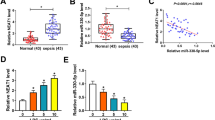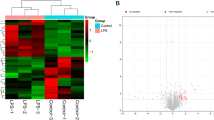Abstract
Sepsis is a life-threatening disease, which can cause the dysfunction of multiple organs, including kidney. Recently, a number of studies found that the long non-coding RNA (lncRNA) is closely associated with the development and progression of sepsis; however, the role of long intergenic non-protein coding RNA 261 (LINC00261) in sepsis-induced acute kidney injury is poorly understood. In this study, we found the expression of LINC00261 was significantly decreased in the serum of patients with sepsis than healthy controls. A similar result was also observed in the mouse model of sepsis induced by lipopolysaccharide (LPS). Further investigations revealed that overexpression of LINC00261 improved the viability, suppressed the apoptosis and reduced the generation of inflammatory cytokines in LPS-treated HK-2 cells. Mechanistically, we confirmed that LINC00261 could function as a sponge to combine with microRNA-654-5p (miR-654-5p) which inhibits nuclear factor-κB (NF-κB) activity by targeting suppressor of cytokine signaling 3 (SOCS3). In conclusion, our results demonstrate that LINC00261 may regulate the progression of sepsis-induced acute kidney injury via the miR-654-5p/SOCS3/NF-κB pathway and therefore provides a new insight into the treatment of this disease.





Similar content being viewed by others
Data availability
Not applicable.
References
Achkar NP, Cambiagno DA, Manavella PA (2016) miRNA biogenesis: a dynamic pathway. Trends plant sci 21:1034–1044. https://doi.org/10.1016/j.tplants.2016.09.003
Bellomo R et al (2017) Acute kidney injury in sepsis. Intensive care medicine 43:816–828. https://doi.org/10.1007/s00134-017-4755-7
Chen LL (2016) Linking long noncoding RNA localization and function. Trends in biochemical sciences 41:761–772. https://doi.org/10.1016/j.tibs.2016.07.003
Fang Y et al (2018) GAS5 promotes podocyte injury in sepsis by inhibiting PTEN expression. Eur rev med pharmacol sci 22:8423–8430. https://doi.org/10.26355/eurrev_201812_16541
Ferrari D, Bianchi N, Eltzschig HK, Gambari R (2016) MicroRNAs Modulate the Purinergic Signaling Network. Trends mol med 22:905–918. https://doi.org/10.1016/j.molmed.2016.08.006
Gao J et al (2020) Up-regulated LINC00261 predicts a poor prognosis and promotes a metastasis by EMT process in cholangiocarcinoma. Pathol res practice 216:152733. https://doi.org/10.1016/j.prp.2019.152733
Guo G, Dai S, Chen Q (2020) Long noncoding RNA LINC00261 reduces proliferation and migration of breast Cancer cells via the NME1-EMT Pathway. Cancer manag res 12:3081-3089. https://doi.org/10.2147/CMAR.S237197
Hattori Y, Hattori K, Suzuki T, Matsuda N (2017) Recent advances in the pathophysiology and molecular basis of sepsis-associated organ dysfunction: Novel therapeutic implications and challenges. Pharmacol ther 177:56–66. https://doi.org/10.1016/j.pharmthera.2017.02.040
Hausser J, Zavolan M (2014) Identification and consequences of miRNA-target interactions--beyond repression of gene expression. Nature rev Gen 15:599–612. https://doi.org/10.1038/nrg3765
Hoste EAJ et al (2018) Global epidemiology and outcomes of acute kidney injury. Nature rev nephrol 14, 607:–625. https://doi.org/10.1038/s41581-018-0052-0
Kellum JA et al (2016) The effects of alternative resuscitation strategies on acute kidney injury in patients with septic shock. Am j respir crit care med 193:281–287. https://doi.org/10.1164/rccm.201505-0995OC
Kondylis V, Kumari S, Vlantis K, Pasparakis M (2017) The interplay of IKK, NF-kappaB and RIPK1 signaling in the regulation of cell death, tissue homeostasis and inflammation. Immun rev 277:113–127. https://doi.org/10.1111/imr.12550
Kopp F, Mendell JT (2018) Functional Classification and Experimental Dissection of Long Noncoding RNAs. Cell 172:393–407. https://doi.org/10.1016/j.cell.2018.01.011
Kumar S, Tripathy S, Jyoti A, Singh SG (2019) Recent advances in biosensors for diagnosis and detection of sepsis: A comprehensive review. Biosens bioelectron 124-125:205–215. https://doi.org/10.1016/j.bios.2018.10.034
Li J, Tan S, Kooger R, Zhang C, Zhang Y (2014) MicroRNAs as novel biological targets for detection and regulation. Chemical Society reviews 43:506–517. https://doi.org/10.1039/c3cs60312a
Liu X et al (2019) Downregulation of lncRNA TUG1 contributes to the development of sepsis-associated acute kidney injury via regulating miR-142-3p/sirtuin 1 axis and modulating NF-kappaB pathway. J cell biochem. https://doi.org/10.1002/jcb.28409
Lu M, Wang C, Chen W, Mao C, Wang J (2018) miR-654-5p targets GRAP to promote proliferation, Metastasis, and Chemoresistance of Oral Squamous Cell Carcinoma Through Ras/MAPK Signaling. DNA cell biol 37:381–388. https://doi.org/10.1089/dna.2017.4095
Majem B, Parrilla A, Jiménez C, Suárez-Cabrera L, Barber M, Marín A, Castellví J, Tamayo G, Moreno-Bueno G, Ponce J, Matias-Guiu X, Alameda F, Romero I, Sánchez JL, Pérez-Benavente A, Moran S, Esteller M, Reventós J, Rigau M, Gil-Moreno A, Segura MF, Santamaría A (2019) MicroRNA-654-5p suppresses ovarian cancer development impacting on MYC, WNT and AKT pathways. Oncogene 38:6035–6050. https://doi.org/10.1038/s41388-019-0860-0
Marchese FP, Raimondi I, Huarte M (2017) The multidimensional mechanisms of long noncoding RNA function. Genome biol 18:206. https://doi.org/10.1186/s13059-017-1348-2
Mayeux PR, MacMillan-Crow L (2012) Pharmacological targets in the renal peritubular microenvironment: implications for therapy for sepsis-induced acute kidney injury. Pharmacol ther 134:139–155. https://doi.org/10.1016/j.pharmthera.2012.01.004
Nair S, Pandey AD, Mukhopadhyay S (2011) The PPE18 protein of mycobacterium tuberculosis inhibits NF-kappaB/rel-mediated proinflammatory cytokine production by upregulating and phosphorylating suppressor of cytokine signaling 3 protein. J immun 186:5413–5424. https://doi.org/10.4049/jimmunol.1000773
Poston JT, Koyner JL (2019) Sepsis associated acute kidney injury. Bmj 364:k4891. https://doi.org/10.1136/bmj.k4891
Ramnarine VR et al (2019) The evolution of long noncoding RNA acceptance in prostate cancer initiation, progression, and its clinical utility in disease management. Eur urol 76:546–559. https://doi.org/10.1016/j.eururo.2019.07.040
Shalmani AA et al (2018) Monomethyl fumarate alleviates sepsis-induced hepatic dysfunction by regulating TLR-4/NF-kappaB signalling pathway. Life sciences 215:152–158. https://doi.org/10.1016/j.lfs.2018.11.010
Shen J, Liu L, Zhang F, Gu J, Pan G (2019) LncRNA TapSAKI promotes inflammation injury in HK-2 cells and urine derived sepsis-induced kidney injury. J pharma pharmacol 71:839–848. https://doi.org/10.1111/jphp.13049
Shi J, Ma H, Wang H, Zhu W, Jiang S, Dou R, Yan B (2019) Overexpression of LINC00261 inhibits non-small cell lung cancer cells progression by interacting with miR-522-3p and suppressing Wnt signaling. J cell biochem 120:18378–18387. https://doi.org/10.1002/jcb.29149
Skirecki T, Cavaillon JM (2019) Inner sensors of endotoxin - implications for sepsis research and therapy. FEMS microbiol rev 43:239–256. https://doi.org/10.1093/femsre/fuz004
St Laurent G, Wahlestedt C, Kapranov P (2015) The Landscape of long noncoding RNA classification. Trends gen 31:239–251. https://doi.org/10.1016/j.tig.2015.03.007
Tang B et al (2020) Downregulation of XIST ameliorates acute kidney injury by sponging miR-142-5p and targeting PDCD4. J cell physiol. https://doi.org/10.1002/jcp.29729
Wang SM, Liu GQ, Xian HB, Si JL, Qi SX, Yu YP (2019) LncRNA NEAT1 alleviates sepsis-induced myocardial injury by regulating the TLR2/NF-kappaB signaling pathway. Eur rev med pharmacol sci 23:4898–4907. https://doi.org/10.26355/eurrev_201906_18078
Wang X, Gao X, Tian J, Zhang R, Qiao Y, Hua X, Shi G (2020) LINC00261 inhibits progression of pancreatic cancer by down-regulating miR-23a-3p. Arch biochem biophys 689:108469. https://doi.org/10.1016/j.abb.2020.108469
Xiong G et al (2019) Long noncoding RNA GSTM3TV2 upregulates LAT2 and OLR1 by competitively sponging let-7 to promote gemcitabine resistance in pancreatic cancer. J hematol oncol 12:97. https://doi.org/10.1186/s13045-019-0777-7
Yong H et al (2020) lncRNA MALAT1 accelerates skeletal muscle cell apoptosis and inflammatory response in Sepsis by decreasing BRCA1 expression by recruiting EZH2. Mol ther nucleic acids 19:97–108. https://doi.org/10.1016/j.omtn.2019.10.028
Zhang J et al (2020) Gelsolin inhibits malignant phenotype of glioblastoma and is regulated by miR-654-5p and miR-450b-5p. Cancer sci 111:2413–2422. https://doi.org/10.1111/cas.14429
Zhu SH et al (2017) Paeoniflorin suppressed high glucose-induced retinal microglia MMP-9 expression and inflammatory response via inhibition of TLR4/NF-kappaB pathway through Upregulation of SOCS3 in diabetic retinopathy. Inflammation 40:1475–1486. https://doi.org/10.1007/s10753-017-0571-z
Funding
This research received no specific grant from any funding agency in the public, commercial or not-for-profit sectors.
Author information
Authors and Affiliations
Contributions
L. X. and L. J. performed experiments, analyzed data and wrote the paper. L. P. performed some in vitro experiments. L. M. designed and supervised the study, and revised the manuscript. All authors read and approved the final manuscript.
Corresponding author
Ethics declarations
Competing interests
The authors declare that they have no competing interests.
Ethics approval
This study was performed in line with the principles of the Declaration of Helsinki. Approval was granted by the Ethics Committee of Shandong Otolaryngological Hospital Affiliated to Shandong University.
Consent to participate
All patients gave written informed consent before participation in this study.
Consent for publication
All participants have consented to the submission of this study to the journal.
Code availability
Not applicable.
Additional information
Publisher’s note
Springer Nature remains neutral with regard to jurisdictional claims in published maps and institutional affiliations.
Rights and permissions
About this article
Cite this article
Li, X., Li, J., Lu, P. et al. LINC00261 relieves the progression of sepsis-induced acute kidney injury by inhibiting NF-κB activation through targeting the miR-654-5p/SOCS3 axis. J Bioenerg Biomembr 53, 129–137 (2021). https://doi.org/10.1007/s10863-021-09874-8
Received:
Accepted:
Published:
Issue Date:
DOI: https://doi.org/10.1007/s10863-021-09874-8




